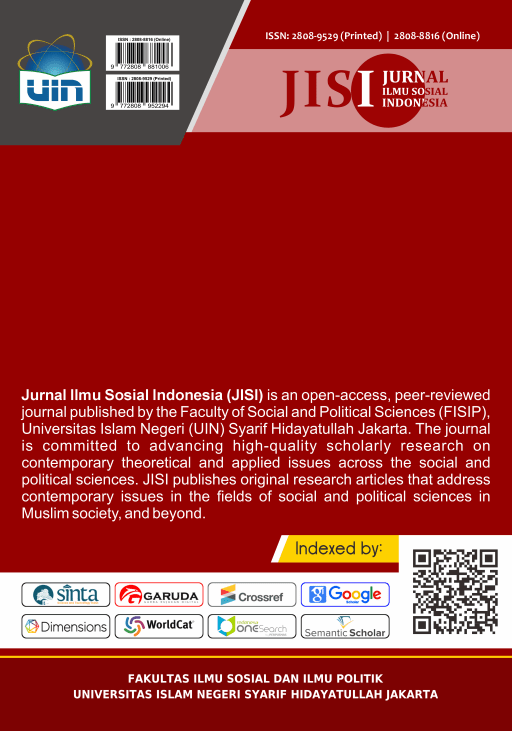Sustainable Development through the Z-Chicken Baznas Initiative: A Community-Based Approach in South Tangerang City
DOI:
https://doi.org/10.15408/jisi.v4i2.37127Keywords:
Economic Independence, Z-Chicken Program, Baznas, Kota Tangerang Selatan, Mustahik, Muzakki,Abstract
Abstract. This research aims to find out the manifestation of economic independence within the community through the Z-Chicken program of Baznas in South Tangerang City. The program is considered as one of the efforts to enhance the welfare of the community. The research method employs a qualitative approach, involving the study of data and documents related to the Z-Chicken program of Baznas in South Tangerang City. Qualitative methods are deemed the most appropriate approach to gather information regarding the improvement of economic independence within the community through the Z-Chicken program of Baznas in South Tangerang City. The study of the Z-Chicken program in South Tangerang as an initiative to enhance the economic independence of the community reveals sustainable impacts, such as transforming beneficiaries into contributors. The presence of this empowerment program should be expanded in its reach. Furthermore, regular mentoring for beneficiaries who have gained from the Z-Chicken program in South Tangerang is essential for program evaluation and development.
Keywords: Economic Independence, Z-Chicken Program, Baznas, Kota Tangerang Selatan, Mustahik, Muzakki.
Abstrak. Penelitian ini memiliki tujuan untuk mencari tahu wujud dari kemandirian ekonomi masyarakat melalui program Z-Chicken Baznas Kota Tangerang Selatan. Program tersebut merupakan salah satu upaya dalam rangka meningkatkan kesejahteraan masyarakat. Penelitian ini menggunakan pendekatan metode kualitatif, yaitu dengan cara mempelajari data dan dokumen yang berhubungan dengan Program Z-Chicken Baznas Kota Tangerang Selatan. Metode kualitatif ini dianggap sebagai pendekatan yang paling tepat untuk menggali informasi mengenai peningkatkan kemandirian ekonomi masyarakat melalui program Z-Chicken Baznas Kota Tangerang Selatan. Penelitian program Z-Chicken Baznas Tangsel sebagai upaya peningkatan kemandirian ekonomi masyarakat, ternyata dapat memberikan dampak yang berkesinambungan, salah satunya mengubah mustahik jadi muzakki. Keberadaan program pemberdayaan ini harus lebih diperluas jangkauannya. Dan adanya mentoring secara berkala terhadap mustahik yang telah menerima manfaat dari program Z-Chicken Baznas Tangsel sebagai bahan evaluasi dan pengembangan program.
Kata Kunci: Kemandirian Ekonomi, Program Z-Chicken, Baznas Kota Tangsel, Mustahik, Muzakki.
Downloads
References
Ahdiat, A. (2022). Indonesia Has the Most MSMEs in ASEAN, how is Its Competitiveness? DataBox Katadata. https://databoks.katadata.co.id/datapublish/2022/10/11/indonesia-punya-umkm-terbanyak-di-asean-bagaimana-daya-saingnya
Astuti, S. A. D. (2021). Independence Economics Community Village Based Utilization Assets Productive at Kabupetan Mojokerto. Journal R&D Policy, Vol. 15, No. 2.
Avilliani. (2023). The Identity of the Nation Lies in Economic Independence. UIN Syarif Hidayatullah Jakarta (UIN Online). https://www.uinjkt.ac.id/avilliani-jati-diri-bangsa-terletak-pada-kemandirian-ekonomi/
Baznas RI. (2023). Z-Chicken Program Materials. https://fliphtml5.com/zpdkt/kkvq/basic
Baznas Tangsel. (2023a). Community Economic Empowerment Through C-More Chicken. Badan Amil Zakat Nasional (BAZNAS) South Tangerang City. https://kotatangerangselatan.baznas.go.id/news-show/Launching_ProgramZ-chickenTahun2022/628
Baznas Tangsel. (2023b). Z-Chicken Merchant Gathering. https://kotatangerangselatan.baznas.go.id/news-show/Silaturrahmi_SaudagarZ-Chicken/1166?back=https://kotatangerangselatan.baznas.go.id/news-all.
Chotib, M. (2023). Endowments and Economic Independence of the Ummah. Yogyakarta: Diva Press.
Girsang, W. (2011). Multidimensional Poverty on Small Islands. Ambon: Pattimura University Press.
Huda, N. (2019). Mustahik Economic Empowerment in Lazismu Surakarta. SUHUF, 31(2), 161–178. https://journals.ums.ac.id/index.php/suhuf/article/view/9042
Iskandar. (2012). A New Paradigm of Poverty Benchmarking: A Study Toward the Use of a Single Indicator. Bogor: IPB Press.
Kartono, K. (2007). Child Psychology. Mandar Forward.
Indonesian Banking Development Institute (LPPI) and Bank Indonesia (BI). (2016). Business Profile of Micro, Small and Medium Enterprises (MSMEs). MSME Development Department (DPUM). https://www.bi.go.id/id/umkm/penelitian/Pages/Profil-Bisnis-UMKM.aspx
Maryam, S. (2015). Learning Independence. New Ray.
Nasution, S. (1988). Qualitative naturalistic research methods. Tarsito.
Nurhayati, E. (2011). Guidance, Counselling, and Innovative Psychotherapy. Student Library.
Rizaty, M. A. (2022). 20.76 million MSMEs in Indonesia Enter the Digital Ecosystem in 2022. Indonesia Data. https://dataindonesia.id/ekonomi/detail/2076-juta-umkm-di-indonesia-masuk-ekosistem-digital-pada-2022
Regulation of the Minister of Home Affairs of the Republic of Indonesia No. 7 of 2007 Article 8 concerning Community Empowerment Cadres.
Sugianto. (2022). Analysis of Factors Affecting Poverty Rate in Banten Province. Sibatik Journal, Vol. 1, No. 4.
Suharto, E. (2005). Building Society, Empowering People, Strategic Study of Social Welfare Development & Social Work. PT. Refika Aditama.
Law No. 24 of 2004 concerning Poverty.
Yuliantri, R. D. A. (2021). Tracing the Discourse of Economic Independence inIndonesia. Journal of Education and History, Vol. 7, No. 1.












